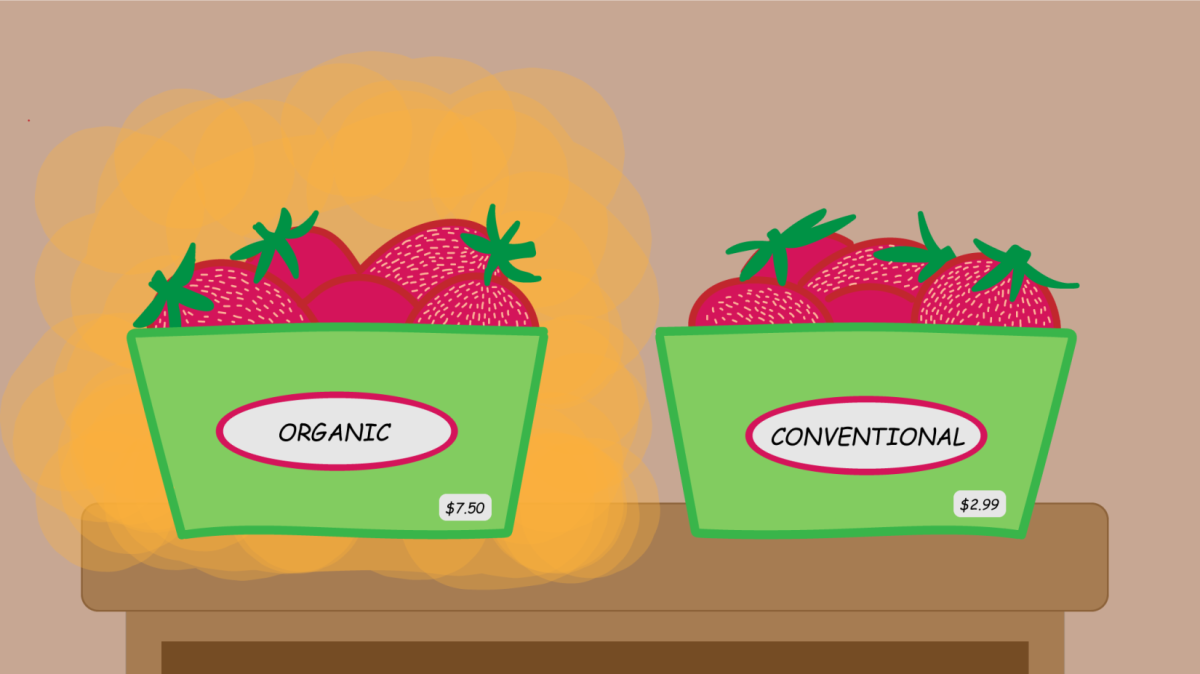Organic foods are often perceived as more natural, nutritious, and environmentally friendly than conventional foods, causing them to receive a glorified and elevated status among produce. The popularity of organic foods can be seen in the global organic foods market trajectory, which grew from $181.5 billion in 2022 to a projected $446.2 billion by 2030.
However, while there may be some benefits to eating organic foods, they should not maintain their current elevated status.
Often, people purchase organic foods based on their perceptions of the benefits, with health being the critical factor, which was seen in a study published in the National Library of Medicine by Raghava R. Gundala and Anupam Singh. In the study, 48% of respondents in a survey said health was their reason for purchasing organic foods. In addition, 19% of respondents said they purchased organic foods due to their pesticide-free nature, and 15% of respondents said it was because they wished to buy more eco-friendly goods.
According to the United States Department of Agriculture (USDA) National Organic Program standards, organic foods are grown without using genetically modified organisms and synthetic chemicals, like human-made fertilizers and pesticides. Due to these regulations, organic foods have lower levels of pesticide residue and environmental benefits.
In fact, organic foods have as much as 81% lower levels of pesticide residue than those found in conventional foods. Coming into contact with large quantities of pesticides may result in acute poisoning or long-term effects such as cancer. Although the purchase of organic foods can quell worry about pesticide residue and decrease the level of exposure, the fact remains that organic foods are not pesticide-free, as many consumers believe.
According to the National Pesticide Information Center, organic foods are not necessarily pesticide-free, and pesticides approved by the National Organic Program standards may be used in organic crop production. Additionally, while these pesticides are typically based on natural substances, some exceptions exist for certain human-made pesticides.
Furthermore, the lower levels of pesticides and their potential benefits have also received attention from critics. Food scientists from the University of California, Davis concluded that “marginal benefits of reducing human exposure to pesticides in the diet through increased consumption of organic produce appear insignificant,” after reviewing a study from the USDA.
On the other hand, proponents of organic foods argue that organic foods have higher levels of nutrients. However, even this potential benefit has been dispelled by professionals.
“Some supporters of organic food production promote it as being ‘better’ without any supporting science. In terms of both nutrition and safety, organic food is no different than foods produced by other contemporary food production practices,” said Penny Kris-Etherton, a registered dietitian and professor of nutrition at Pennsylvania State University’s College of Health and Human Development, according to the American Heart Association.
Aside from possible health benefits, people who support organic foods also assert that organic foods are more environmentally friendly than conventionally grown produce because the lower use of pesticides reduces air, water, and land contamination. Although a decrease in synthetic pesticide use benefits the environment, these methods may not advance long-term sustainability, according to an entry in Britannica by Leslie Duram, a professor of geography and environmental resources at Southern Illinois University Carbondale.
According to Duram, this is due to the practices of large-scale organic farms, which often utilize inputs of fertilizer that are generated off-site, unlike smaller-scale organic farms, which use on-site inputs. This contrast in the practices of large-scale and smaller-scale organic farms is significant as off-site inputs usually require greater fossil fuel use, contributing to air pollution, water pollution, and global warming.
Moreover, Duram also notes that some lower-income countries are currently witnessing trends where they cultivate organic crops exclusively for export to wealthier nations. This practice sometimes creates a situation where the farmers can’t afford to buy the organic foods they produce, which further exacerbates food insecurity.
Overall, people must learn to ignore the elevated status of organic foods and take on a more comprehensive approach when choosing between organic and conventional produce.












